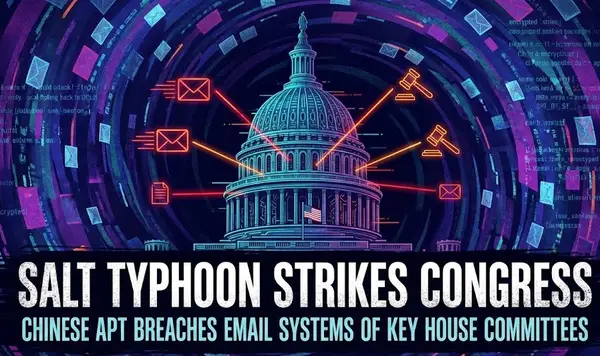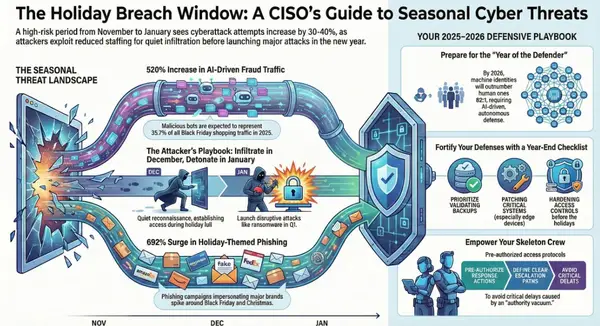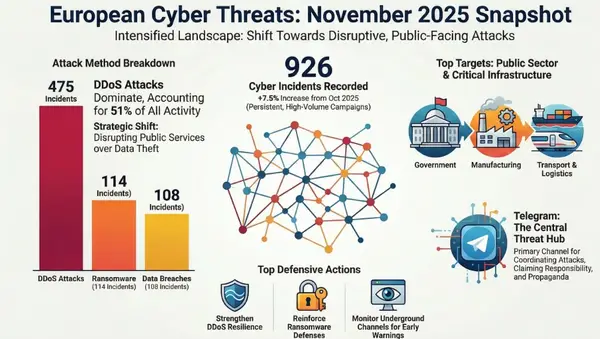The £206 Million Wake-Up Call: How the Co-op's 2025 Cyber Attack Reshaped UK Retail Security

In April 2025, the Co-operative Group became the latest victim in what security experts have called one of the most devastating waves of cyber attacks to hit the UK retail sector. The malicious breach cost the retailer at least £206 million in lost revenues and transformed the organization from a thriving cooperative into a cautionary tale about the true cost of cyber vulnerability in modern retail.
The Attack That Shook British Retail
The Co-op's cyber incident began in late April 2025, though evidence suggests attackers had gained access to certain systems many days before the official confirmation. What started as an attempted unauthorized access quickly escalated into a full-scale crisis that would impact millions of customers and thousands of stores across the UK.
The timing was particularly devastating. Coming on the heels of similar attacks on Marks & Spencer and Harrods, the Co-op breach represented the third major retail cyber incident in just ten days. The company's stock-ordering system went down, normal supply processes were disrupted, and the company struggled to accept multiple forms of payment, including contactless and chip-and-PIN.
The Human Cost Behind the Numbers
While the £206 million figure captures headlines, the real impact extended far beyond financial losses. The Co-op reported an underlying pre-tax loss of £75 million in the first half of 2025, compared to a £3 million profit in the same period the previous year. But these numbers only tell part of the story.
The BBC ran articles with pictures of empty shelves in Skye, Kyle of Lochalsh, and Islay, highlighting how the attack particularly affected rural communities where the local Co-op often serves as the only large supermarket. For these communities, the cyber attack wasn't just an inconvenience – it was a genuine crisis affecting their ability to access essential goods.
The breach also compromised the personal data of all 6.5 million Co-op member customers. The attackers accessed name, date of birth and contact details, though they were unable to access members' financial information. While passwords remained secure, the psychological impact on millions of customers who trusted the Co-op with their data cannot be understated.
The Anatomy of a Modern Retail Cyber Attack
The Co-op attack bore the hallmarks of sophisticated criminal operations that have increasingly targeted the retail sector. The attackers social-engineered an employee, took over their account by resetting the password, used the account to access Co-op's network, then went after the Active Directory (Windows) database file, which holds encrypted credentials for employee accounts.
This wasn't a random attack but part of a coordinated campaign. The hackers, who contacted the BBC directly, operate through DragonForce - a ransomware-as-a-service platform that allows anyone to use their malicious software to carry out attacks and extortions. The English-speaking criminals, who asked to be known as "Raymond Reddington" and "Dembe Zuma" after characters from the US crime thriller Blacklist, ominously declared they were "putting UK retailers on the Blacklist."
Security experts believe the tactics are similar to those of Scattered Spider (also known as Octo Tempest), a loosely coordinated group of young hackers - some only teenagers - who operate on Telegram and Discord channels. Their youth belies their sophistication: these attackers had "spent a while seated in [Co-op's] network" before being discovered, demonstrating patience and technical capability that has brought household names to their knees.
Swift Response, Limited Damage
Despite the severity of the breach, the Co-op's response demonstrated the importance of preparedness. In an exclusive interview with the BBC, the hackers themselves revealed a crucial detail: Co-op's IT team made the critical decision to "yank their own plug" when they discovered the attack in progress, preventing the criminals from deploying ransomware across the network.
"Co-op's network never ever suffered ransomware. They yanked their own plug - tanking sales, burning logistics, and torching shareholder value," the frustrated criminals admitted to the BBC. While they had successfully stolen customer data and "spent a while seated in their network," Co-op's detection and rapid shutdown prevented the far more devastating ransomware encryption that would have locked the company out of its own systems.
This decisive action explains why Co-op recovered more quickly than Marks & Spencer, which wasn't able to prevent the ransomware deployment and faced weeks of suspended online orders and an estimated £43 million weekly cost. As cyber expert Jen Ellis from the Ransomware Task Force told the BBC: "Co-op seems to have opted for self-imposed immediate-term disruption as a means of avoiding criminal-imposed, longer-term disruption. It seems to have been a good call for them in this instance."
The company's funeral homes had to resort to paper-based systems, and internal communications revealed the severity of the threat. Employees were advised to verify all Microsoft Teams meeting attendees on camera due to concerns about compromised internal accounts. This level of caution, while disruptive, likely prevented further infiltration.
The Broader Context: UK Retail Under Siege
The Co-op attack wasn't an isolated incident but part of an alarming trend that has made 2025 one of the most devastating years for cyber attacks and data breaches. In the UK specifically, ransomware attacks on retailers surged by an alarming 74.71% in the first quarter of 2025. The retail sector's vulnerability stems from several factors:
- Large volumes of customer data: Retailers process millions of transactions daily, making them treasure troves for cybercriminals
- Complex supply chains: Integrated systems create multiple potential entry points
- Legacy infrastructure: Many retailers operate on outdated systems that lack modern security features
- Time-sensitive operations: The need for constant uptime makes retailers more likely to pay ransoms
The proportion of businesses conducting overall risk assessments currently stands at just 29%, revealing widespread underinvestment in cybersecurity that leaves organizations vulnerable and ill-prepared.
Lessons Learned: Building Resilience in Retail
The Co-op incident, while devastating, offers crucial lessons for the entire retail sector:
1. Sometimes Pulling the Plug is the Right Call
Co-op's decision to voluntarily disconnect their systems - what the hackers angrily described as "yanking their own plug" - saved them from ransomware encryption. This self-imposed disruption was far preferable to criminal-imposed, longer-term devastation. Organizations need clear protocols for when to take systems offline entirely.
2. Assume Breach, Not Immunity
Leading organisations are moving towards cyber resilience as a strategic priority to limit the impact of cyber incidents in the face of growing challenges. The approach encourages organizations to assume that significant incidents will occur and to implement measures that enable them to absorb, recover, and learn from events.
3. Invest in Detection and Response
The Co-op's ability to detect the hackers while they were still preparing their ransomware deployment was crucial. As Professor Oli Buckley from Loughborough University noted, "rebuilding trust is a bit harder" after an attack, but showing "that lessons have been learned and there are stronger defences in place" is essential.
4. Address the Human Factor
With social engineering at the heart of many attacks, employee training becomes critical. The fact that attackers gained initial access by tricking help desk workers emphasizes the need for robust verification procedures and security awareness training at all levels.
5. Modernize Infrastructure
Legacy systems are prime targets for attackers. Regular patching, network segmentation, and modern authentication methods like multi-factor authentication are no longer optional – they're essential for survival in today's threat landscape.
The Government Response and Industry Action
The severity of the retail attacks prompted swift government action. Four people were arrested in the UK as part of a National Crime Agency investigation into cyber attacks targeting M&S, Co-op and Harrods, demonstrating that law enforcement is taking these threats seriously. The arrests included two males aged 19, another aged 17, and a 20-year-old female, all apprehended in the West Midlands and London on suspicion of Computer Misuse Act offences, blackmail, money laundering and participating in organized crime.
The National Cyber Security Centre (NCSC) has been working closely with affected retailers, with officials describing the attacks as a "wake-up call" for businesses across all sectors. The government also announced a £16 million cyber defence package, recognizing that cybersecurity is now a matter of national economic security.
Looking Forward: The New Reality of Retail
The Co-op's experience, while painful, has catalyzed important changes across the retail sector. Security Minister Dan Jarvis's warnings about the "very significant" volume of attacks facing the UK underscore the urgency of the situation. His emphasis that cyberattacks are "destroying businesses and ruining lives" reflects the human cost beyond financial metrics.
For the Co-op specifically, Chair Debbie White's commitment to rebuild "better and stronger to meet the challenges and opportunities that lie ahead" signals a transformation in how the organization approaches cybersecurity. The full cost of the attack may ultimately exceed the reported £206 million, as the company expects continued impact throughout the second half of 2025.
Key Takeaways for Retail Leaders
As we reflect on the Co-op incident and its aftermath, several critical points emerge for retail leaders:
- Cybersecurity is a boardroom issue: With attacks causing hundreds of millions in losses and threatening business survival, cyber resilience must be a strategic priority
- Speed matters: The Co-op's quick response limited damage – having and testing incident response plans is crucial
- Supply chain security is essential: With attacks often coming through third-party connections, vendor risk management is critical
- Investment in security pays off: While the Co-op suffered significant losses, their ability to prevent complete ransomware deployment saved them from potentially catastrophic damage
- Collaboration is key: Information sharing between retailers and with government agencies helps the entire sector defend against evolving threats
Conclusion: From Crisis to Catalyst
The Co-op's £206 million cyber attack represents more than just a financial loss – it's a transformative moment for UK retail. Cybersecurity can no longer be treated as a secondary concern or isolated function; it must be a core component of business strategy.
While the immediate impacts have been severe, the incident has sparked crucial conversations about digital resilience, prompted government action, and forced the entire retail sector to confront its vulnerabilities. The Co-op's experience, though painful, may ultimately strengthen the entire UK retail ecosystem against future threats.
As retailers continue to digitalize and cyber threats evolve, the lessons from April 2025 will remain relevant. The question isn't whether another attack will occur, but whether the sector has learned enough to minimize its impact when it does. For the Co-op and its peers, the journey from victim to victor in the cyber realm has only just begun.
Related Articles
- Major Breakthrough: Four Arrested in £440m Cyber Attacks on UK Retail Giants - Full details on the arrests and ongoing investigation into the retail attacks
- Major Cyber Attacks 2025: A Comprehensive Analysis - The complete overview of 2025's most significant cyber incidents
This article is based on publicly available information about the Co-op cyber attack and broader retail security incidents in 2025. Organizations mentioned should be contacted directly for the most current information about their security measures and incident response.





